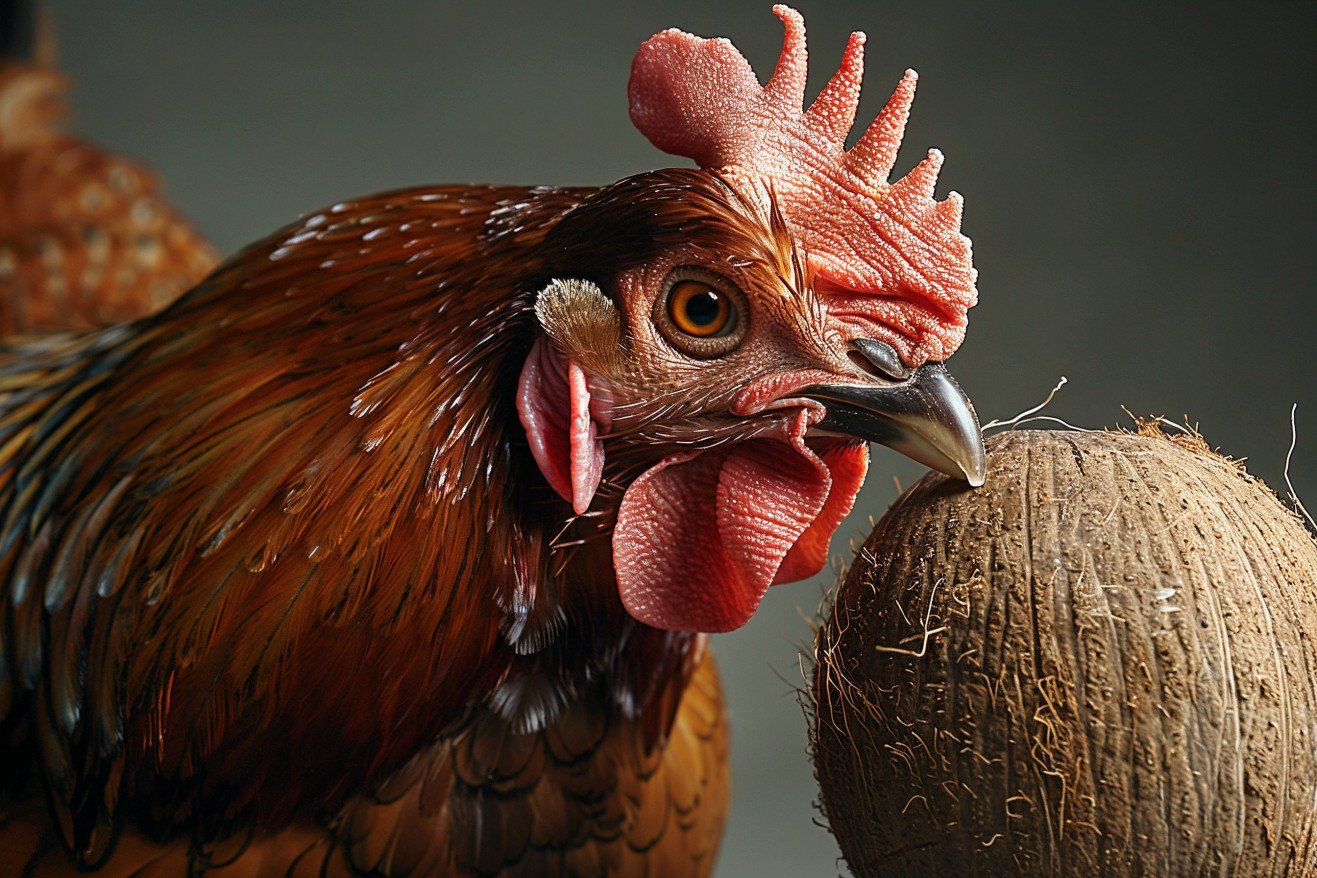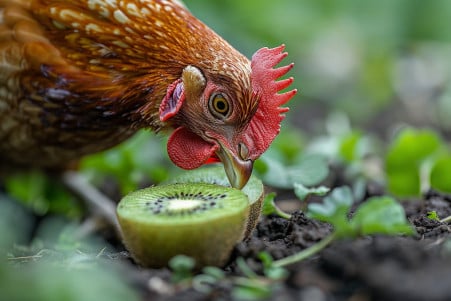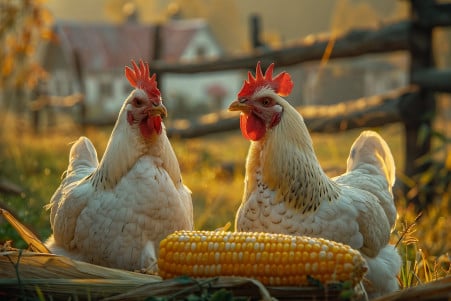Can Chickens Eat Coconut? A Look at the Pros and Cons
11 June 2024 • Updated 10 June 2024

Although coconuts are safe for chickens, there are some important things to know before you decide to give this tropical fruit to your birds. Because of their high fat content, coconuts should be considered a special treat, and you should make sure to take off the tough husk and shell so that you can give your chickens the meat or milk.
This article will discuss the nutritional content and potential downsides of giving chickens coconut by looking at information from veterinarians and experts in the field of poultry. By the end, you will have the information you need to decide if you want to give your flock this special food in a way that is both safe and healthy.
Can chickens eat coconut?
How to Feed Coconut to Chickens
If you're ready to feed coconut to your chickens, there are a few steps you need to take to ensure it's safe for them to eat. First, you'll need to remove the hard outer husk and the shell to get to the coconut meat. Cluckin explains that you should then chop or shred the coconut meat into smaller pieces to make it easier for your chickens to digest.
Coconut water and coconut milk can be given to chickens as they are or mixed with other treats. However, BackYardChickens warns that you should never give your chickens sweetened or processed coconut products because they can throw off their nutritional needs.
When you first start feeding your chickens coconut, you should introduce it slowly so that their digestive systems have time to get used to it. AllotmentGarden recommends that you start by giving your chickens coconut as an occasional treat and then gradually increase the frequency. You should always feed your chickens coconut in moderation and never give them so much that it replaces their regular diet.
By following these guidelines, you can safely and effectively add coconut to your chickens' diet. And, because coconut has a lot of nutrients that chickens can benefit from, it can be a great addition to their regular feed, as we'll discuss in the next section.
Nutritional Benefits of Coconut for Chickens
Coconut has a number of nutritional properties that can help chickens maintain their health and well-being. For example, as the PMC explains, coconut oil is a good source of medium-chain fatty acids, which are absorbed directly into the bloodstream and serve as a quick and efficient source of energy. In addition, coconut is high in lauric acid, which has been found to have antimicrobial and antiviral effects, which could help boost the immune system in chickens.
In addition to these healthy fats, coconut is a good source of fiber, vitamins, and minerals that can help chickens in a number of ways. For example, a paper in Animals notes that coconut flour is high in insoluble and soluble fibers, which can help support healthy digestion when added to a chicken's diet.
The research on coconut meal as a feed ingredient also suggests that coconut could be good for chickens. The mannan, or mannose-based polysaccharides, in coconut meal can serve as a prebiotic, which means they can help feed the good bacteria in the gut and improve gut health.
While the protein content of coconut meal may be lower than that of other feed ingredients, the nutritional properties of coconut, including the ones listed above, mean it can offer a number of benefits to chickens. That said, it's also important to note that there are some potential downsides and risks to feeding chickens coconut, which we'll cover in the next section.
Potential Risks and Hazards of Coconut for Chickens
Although coconut can be a source of valuable nutrients for chickens, there are also some potential risks and hazards to consider. According to Backyard Poultry, coconut is high in saturated fat, which can cause chickens to gain weight if they eat too much of it. In fact, if chickens consume too much coconut oil, it can cause an increase in cholesterol levels and artery hardening, which are the same effects that occur in humans.
Moreover, the Feedipedia resource explains that copra meal, which is the dried meat or kernel of the coconut, is prone to rancidity and aflatoxin contamination if it's not dried and stored correctly. In addition, the high fiber content in coconut meal can lead to a decrease in feed intake and growth, especially in young chickens.
To prevent these issues, it's important to make sure that coconut is used as a supplement to a well-balanced commercial chicken feed, not a replacement. As recommended on Yardique, it's important to make sure that you feed your chickens coconut in moderation. If you do this, the rewards should outweigh the risks.
Suggested Quantities and Feeding Tips
If you decide to feed your chickens coconut, it's important to make sure that you're doing so in a way that's healthy for your chickens. BackYardChickens notes that coconut should be limited to 10% of a chicken's daily diet. The Cluckin resource goes on to say that coconut meal should make up no more than 20% of the diet for layers and broilers. Meanwhile, coconut oil can be added to the diet at a level of 3% to have a positive impact, as the IOPscience study explains.
When you first introduce coconut to your chickens, it's important to make sure that you're doing so slowly to avoid any digestive issues. The Cluckin article suggests that you start by giving your chickens coconut as a treat and then slowly increase the amount that you give them. You should also adjust the amount that you give them based on their age, size, and health. If you follow these tips, you should be able to make sure that you're giving your chickens the benefits of coconut in a way that's safe and healthy.
How to Add Coconut to a Chicken's Diet
Coconut should be used as a supplement or treat, not a replacement for the other foods in a chicken's diet. Per the Yardique article, it's important to make sure that chickens are still getting a complete, balanced commercial feed that meets all of their nutritional requirements. When adding coconut to a chicken's diet, the BackYardChickens forum recommends introducing it slowly and watching for any adverse reactions or changes in the chickens.
Coconut can also be used as a treat or form of environmental enrichment, especially for chickens that are allowed to free-range. The ScienceDirect study showed that the addition of coconut oil to layer diets improved production and feed efficiency. However, the amount of coconut that's added to the diet should be adjusted based on the chicken's age, breed, and production level to prevent potential problems like obesity and nutrient imbalances.
By adding coconut to a chicken's diet as a supplement, you can make sure that the chickens get the advantages of this special food while still making sure that all of their nutritional needs are met.
Conclusion: Feed Coconut in Moderation
Yes, chickens can eat coconut, and it can be a healthy part of their diet when fed in moderation. InfoVibrant notes, coconut is packed with a variety of nutrients that are good for chickens, including vitamins, minerals, and healthy fats. However, coconut meat is high in fat, especially saturated fat, so chickens can develop obesity and other health problems if they eat too much.
To help chickens eat coconut, it should be shredded or cut into smaller pieces before it's given to them. Cluckin explains that coconut water is a safe, natural, and hydrating liquid for chickens that contains electrolytes, vitamins, and minerals.
While there are many benefits to feeding coconut to chickens, there are also several risks and drawbacks. These include the high fat content, digestive problems, choking, mold and spoilage, nutritional imbalance, and potential allergies. Yardique suggests introducing coconut slowly, watching for any adverse effects, and limiting it to 20% of the diet.
Take your flock's specific nutritional needs into account when you decide how to incorporate coconut. With proper care, coconut can be a valuable part of a balanced diet.


